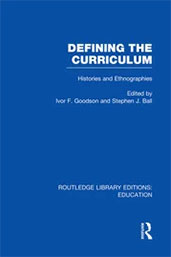Defining the Curriculum: histories and ethnographies
Subjects for Study: towards a social history of curriculum
With no tertiary base and hence no specialist scholars involved, except random specialists from other disciplines, the Hertfordshire strategy was to develop an A-level syllabus from groups working in the secondary schools, This offered the promise of tailoring 'a course to the needs of the kids' and not to 'have to meet the requirements of other people's courses'. But the crucial reason in terms of the subject teachers’ material self-interest was often frankly admitted:
I think we had got to prove that environmental studies was something that the most able of students could achieve and do something with... if you started off there all the expertise and finance that you put into it will benefit the rest - your teaching ratio goes up etc. and everyone else benefits. (interview, Topham)
The survival rationale was always a strong factor:
I just thought if you're outside this you've had it in schools: it was already happening in some schools where a [rural studies] teacher was leaving, they didn't fill the place, because they gave it to someone in the examination set up. And beyond survival the reasons for an academic 'A' level were simply 'because if you didn't you wouldn't get any money, any status, any intelligent kids.' (interview, Carson)
The Hertfordshire A-level in environmental studies which was ultimately devised is a recognition of the aspiration and efforts of these rural studies teachers. What has subsequently been denied is not that environmental studies represents a valid area of curriculum but that it can thereby claim to be an academic discipline. Such claims it would appear arc best validated through university scholarship and without a university base status passage to acceptance as an academic discipline has been denied.
MacKinder's strategy of using the school subject base to help bring about the creation of university departments was correctly conceived. As Carson noted at the Offley conference, new contenders for academic status are often placed in an impossible situation since they are asked, 'What evidence have you that universities would accept this sort of A-level?' On making enquiries to universities, the reply was "show us the successful candidates and we will tell you, “A chicken and egg situation” (Carson, 1971, p. 6).
